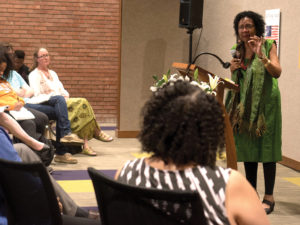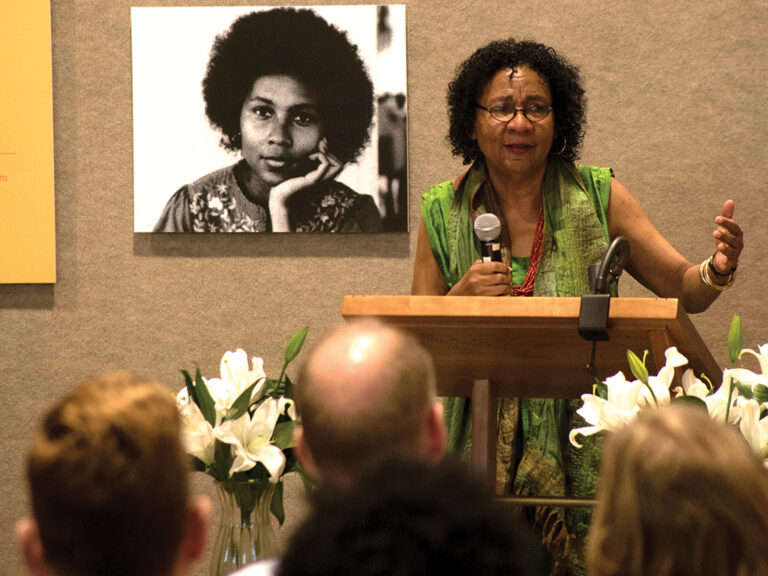
It’s not often that the library of a small, liberal arts college is selected to be the home for the papers of a major writer. bell hooks’ decision to leave her works to Berea College is an exception to that rule. But, that hooks would do the unexpected really comes as no surprise. Seeing past expectations, questioning accepted wisdom, and challenging the status quo are hallmarks of her work as a teacher, writer, and provocateur.
Born Gloria Jean Watkins in Hopkinsville, Kentucky, hooks’ intellectual journey took her from her small-town origins to Columbia College in Missouri, Stanford University in California, and to teaching appointments at some of America’s finest colleges and universities. Her influence on modern culture, especially in higher education, began in 1981 with her book, Ain’t I a Woman: Black Women and Feminism. The book challenged the dominant feminist narrative of the women’s experience written about in numerous feminist works of the 1960s and 70s, which assumed that the experiences of college educated, middle class, white women were the norm. The experiences of women of color were not seen as central to feminism because the prevailing wisdom was that the oppression of black women came from racism not sexism.
“My life experience,” hooks wrote, “has shown me that [racism and sexism] were inseparable, that at the moment of my birth, two factors determined my destiny: my having been born black and my having been born female.” For over 40 years, hooks elaborated on these ideas, expanding the range of groups and causes she defends, while keeping clearly in mind the belief that any “struggle for liberation” must have “as its fundamental goal the liberation of all people.”
The decision to place her papers at Berea was not an easy or obvious choice. Major libraries, including Harvard University, actively pursued the collection, and some friends counseled hooks to consider the personal economic benefits of selling the collection to the highest bidder. In the end, hooks’ decision was driven by a sense of community and identity. She explained the decision during an event in April celebrating the presentation of the archive.

“Think of all the bad press Kentucky is getting right now,” she said. “And think about how much of that bad press has its roots in reality. But then think of the other press, which is people like myself and Crystal Wilkinson (Berea’s Appalachian writer-in-residence) [… who] see ourselves as representing a new Kentucky, a different Kentucky and that was one of the reasons I wanted my papers and my life here because I felt like, as [Berea College President] Lyle [Roelofs] said in his wonderful introduction, everything that I am, the seeds were sown in the soil of Kentucky.”
The archive, which will be publicly accessible, brings with it new possibilities for research and an enhanced academic experience for Berea’s students. Rachel Vagts, head of special collections, was instrumental in bringing the collection to the Hutchins Library. “I’m very passionate that the material we have in our library, particularly in special collections, is for our students,” said Vagts. Working with letters, manuscripts, and other rare items develops a different, more immediate relationship with the past. She recalled that former Berea College President William G. Frost (1892-1920) encouraged the development of special collections because he believed Berea “should have rare books because students at Berea should have the same kind of access to important items as students at other top-quality institutions do.”
Vagts notes that having the bell hooks Archive in the library will have a significant impact on the intellectual life of campus. “I’ve worked at research 1 schools, at big historical societies, and at small liberal arts colleges,” she said, “and this is a very interesting collection to have, the kind of collection that will bring a different kind of researcher to work with it.”
Already, the archive has had an influence on some of Berea’s students. Qrescent Mason, assistant professor of women’s and gender studies, used the archive with her fall semester class—the first to work with hooks’ papers. “I am excited about being able to use bell hooks’ papers,” said Mason. “I think they will be transformational for a lot of scholars who know bell hooks in different ways but not in the intimacy of her writing.”
The archive will be more than a gateway to the past. hooks remains on campus as distinguished professor in residence in Appalachian studies and leads the bell hooks Institute, which attracts guests from across the world. To date, she’s brought Emma Watson, one of Hollywood’s most sought after young stars; feminist icon Gloria Steinem; transgender advocate and actress Laverne Cox (star of the Netflix series Orange is the New Black); scholar, activist and author Cornel West (Race Matters); and Dr. Henry Louis Gates (Alphonse Fletcher University Professor at Harvard University and host of the PBS series Finding Your Roots) to Berea. They came to dialogue with a woman who changed the face of feminism, a woman whose life’s work has been to challenge the preconceptions of American society about what it means to be black, female, and a Kentuckian.


